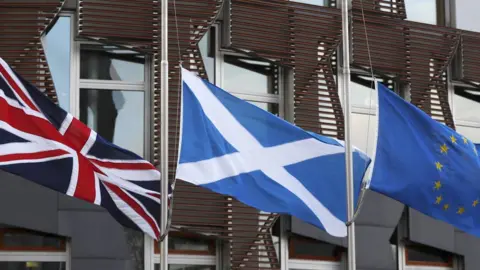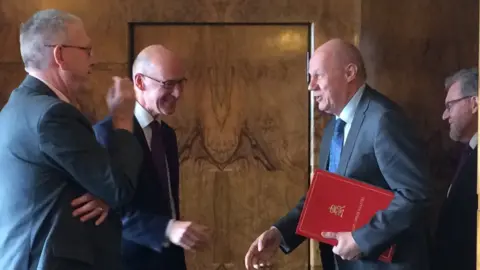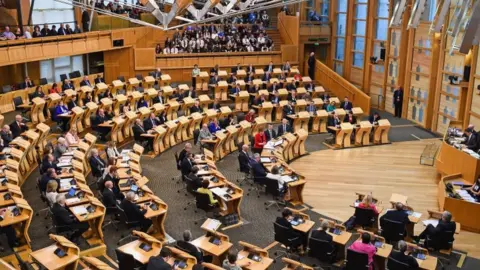No Holyrood consent for Brexit bill 'at this time'
The Scottish government will not ask Holyrood to give consent to the EU Withdrawal Bill in its current form.
Brexit minister Mike Russell told MSPs that the legislation posed a threat to the founding principles of devolution.
The Scottish government said there will be no consent motion for MSPs to vote on "at this time", and it will instead seek to amend the bill.
The UK government has insisted that Holyrood will see "significant" new powers devolved after Brexit.
Talks between the two governments over post-Brexit powers for Scotland ended in stalemate in August, although more are expected to be scheduled.
The EU Withdrawal Bill, which won its first Commons vote in the early hours of Tuesday, is the first step in the legislative process of taking the UK out of the European Union.
This process is chiefly one for Westminster, but the consent of the Scottish and Welsh administrations will be sought because the move cuts across devolved areas.
The Edinburgh and Cardiff governments have been working together on their opposition to the bill, which both have claimed represents a Westminster "power grab" on the devolved parliaments.
Both have said they cannot recommend consent be given to the legislation in its current form, but have said they will put forward potential amendments to UK ministers.
 Reuters
ReutersThis was underlined by a formal legislative consent memorandum published by the Scottish government, which underlined "fundamental" opposition to the "basic approach" of the legislation as drafted.
The memo said ministers did not intend to bring forward a consent motion, which would be voted on by MSPs, on the current draft of the bill - they said this could follow at a later date, if the approach of amending the legislation fails to resolve differences.
The proposal in the Withdrawal Bill are that powers over areas like fishing and farming, which are not currently reserved but which are exercised in Brussels, will be repatriated first to Westminster before decisions are taken on where joint frameworks should be established and what form devolution should take.
Mr Russell told MSPs that the legislation "proposes to alter permanently the fundamental principle of devolution".
He said: "The EU Withdrawal Bill appears to represent a deliberate decision by the UK government to use the process of Brexit as cover for taking powers in areas of policy which are clearly within the responsibility of this parliament.
"In areas of Scottish devolved responsibility vital to the success of our country, such as agriculture, the environment, fisheries, forestry, research, or justice cooperation, the Scottish Parliament will have no say over what comes back from the EU on withdrawal or what is done with these important policy areas afterwards."
'Significant new powers'
However, UK government ministers have repeatedly insisted there are no plans to take powers away from the devolved parliaments, saying the opposite is the intention.
Scottish Secretary David Mundell said any claims of a "power grab" were "simply nonsense", but said the UK government wanted to press ahead with talks as quickly as possible.
He said: "It is vital we get this right. Our top priority must be to avoid putting up any barriers to trade within the UK, which would do untold damage to Scottish businesses.
"It is important we work together on these complex issues. Rather than playing politics, the Scottish government must recognise its responsibility to work constructively with the UK government as we prepare to leave the EU.
"The sooner we can press ahead with detailed talks the better. We want to discuss the Scottish government's views on this."

Following Mr Russell's speech to MSPs, parties took a consensual approach - something Mr Russell said gave him "additional hope" that changes could be secured.
Scottish Conservative MSP Jackson Carlaw offered to meet with Mr Russell to address concerns and work towards Holyrood eventually giving consent to the bill, saying: "If there is genuine concern matched by an equally genuine resolve to address and overcome this, then the Scottish Conservatives at Holyrood will play our part."
Mr Russell welcomed this as a "significant step forward", and told another Tory member, Adam Tomkins, that he would provide details of the proposed amendments "as soon as we possible can".
Labour has tabled amendments at Westminster seeking to amend some areas which the Scottish government has voiced concern about, with Jeremy Corbyn penning one aiming to "remove proposed restrictions" on the ability of Holyrood and other parliaments "to legislate on devolved matters".
MSP Lewis Macdonald said it was "time for cool heads and grown up politics", and called for a guarantee from the SNP that it would back Labour's amendments at Westminster.
Mr Russell said he had "considerable hope" that opposition groups at Westminster and all parties at Holyrood and in the devolved parliaments could work together to achieve the changes needed.
 Getty Images
Getty ImagesScottish Green MSP Ross Greer raised concerns about the UK government taking on extra executive powers via the legislation, drawing an assurance from Mr Russell that the Scottish government would not exercise any so-called "Henry VIII powers" without "proper scrutiny" at Holyrood.
And Lib Dem MSP Tavish Scott said the UK government should give a "guarantee" that everything currently devolved would stay devolved, saying his party would work with the Scottish government on "strengthening not weakening the Scottish Parliament".
Legislative consent
Under what is known as the Sewel Convention, the UK government agreed that it would "not normally" legislate on any devolved matters without the explicit consent of the devolved administrations, expressed via a legislative consent motion.
The process involves Holyrood's presiding officer studying the wording of the motion to determine if it is competent - in 2015 then-incumbent Tricia Marwick rejected one seeking to block the Trade Union Bill from applying to Scotland - before MSPs debate and vote on it.
However, in the Supreme Court case over the triggering of Article 50, justices ruled that the Sewell convention remains a political convention rather than a legally binding one, saying that the principle of legislative consent "does not give rise to a legally enforceable obligation".
This means Holyrood does not have the power of veto over the legislation, but could cause significant political difficulties for UK ministers.
